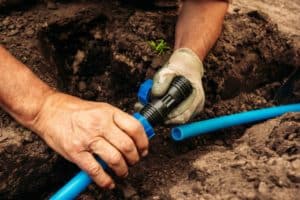Installing a new sprinkler system can feel overwhelming, especially when it comes to costs. In this guide, we’ll break down what you need to know so you can plan with confidence.
There are many benefits to having a sprinkler system professionally installed at your home or business; however, it is an investment.
As an irrigation professional, I get asked this question all the time: “How much does a sprinkler system cost?” Unfortunately, the quick answer is not always the best answer, but potential customers want an answer that’s easy to understand.
The quick answer: Most commonly, an average residential sprinkler system installation ranges between $3,000.00 and $5,000.00.
For the long answer, there are many factors that determine the cost of a professionally installed sprinkler system.
Questions to Consider When Installing a New Sprinkler System:

- What is the water supply? What is the water pressure and volume of water coming from the supply? (Logistically speaking, this is one of the biggest factors in designing and pricing a system. The path of the main sprinkler supply line needs to be determined before even designing the system itself. The water pressure and volume dictate how many sprinkler heads can be dedicated to one line or zone).
- How big is the area that is being watered? Front lawn and/or back lawn?
- Do we need to water obscure areas such as the shady side of the house, behind the shed, the area around the kids swing set, etc.?
- What are we watering? Lawn, garden and/or landscape areas? (Consider sensitive areas of the landscaping that need to be watered separately from the turf areas. Or maybe a customer has a garden in the back yard, and it has different moisture requirements than the lawn and landscape).
- Are there any special circumstances? Are there any hard to reach areas that will require extra labor? Maybe the job has to be done in phases to accommodate other projects on the same property or maybe the customer will choose to upgrade the main components of the system to allow for extra durability or water saving features.
These are just a few of the determining factors that influence the cost of professionally installing or repairing a lawn/landscape sprinkler system. Be sure to ask these questions, and be clear on the scope of operations if you are thinking about having a system installed on your property.
For a free sprinkler system installation estimate, call Irrigation Inc. at (440)935-1182. We’re always up for a new challenge.
Average Cost Ranges by Type
Above-Ground Systems
Typically, the most affordable, ranging from $1,500–$3,500, but they require more manual setup and aren’t as durable.
In-Ground Systems
The most common option for homeowners, usually $3,000–$7,000, offering convenience, durability, and an automated schedule.
Drip Irrigation Systems
Ideal for gardens and landscaping beds, ranging from $500–$3,000, depending on size and complexity.
Smart Irrigation Systems
Equipped with weather sensors and Wi-Fi controls, usually $4,000–$8,000, but can save money long-term through water efficiency.
Adding these ranges gives homeowners a clearer expectation based on their property and preferences.
Operating & Maintenance Costs
Beyond installation, it’s important to plan for yearly upkeep and operation:
Water Costs
On average, homeowners may spend $14.40–$24 per month on sprinkler systems. During peak summer use, it could cost $20–$50 per month on extra water.
Seasonal Maintenance
Professional inspections and adjustments typically run $100–$300 per year.
Repairs
Fixing broken sprinkler heads or valves usually costs $50–$150 per repair, depending on the issue.
Winterization/Blowouts
In colder regions, protecting the system from freeze damage averages $75–$150 per season.
Factoring in these ongoing expenses ensures you know the true long-term investment of your sprinkler system. Considering both the installation price and the overall lawn irrigation system cost gives you a clearer picture of what to expect over time.
Conclusion
A sprinkler system is a valuable investment that keeps your lawn healthy and vibrant, but costs can vary depending on factors like system type, property size, and ongoing maintenance needs. By understanding both installation and long-term expenses, homeowners can make informed decisions and avoid surprises down the road. Since every property is unique, it’s always best to consult a professional who can assess your needs and recommend the most efficient system for lasting results.
